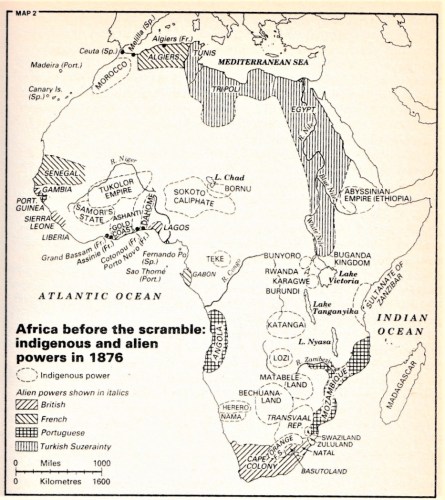The Scramble for Africa
This is the general briefing to all players. There are also a very short individual brief for each player.
THE SCRAMBLE FOR AFRICA
The Conference of Berlin November 1884
The reasons for the conference
Following on from the Congress of Berlin in 1878 which resolved a number of issues in Europe, the German Chancellor Otto von Bismarck has called a conference to examine a number of issues relating to the so-called ‘scramble for Africa’. This refers to the increasing pace of exploration and colonisation of Africa. There are fears that a clash between any of the major powers (basically Great Britain, France, Germany, Austria-Hungary and Russia*) in Africa could lead to a war in Europe. The opportunity is thus being taken to discuss and attempt to resolve some of those potential flash points.
*Austria-Hungary is occupied with their plans for expansion in the Balkans Russia with expansionand towards India.
Civilisation and Africa
As with many parts of the world, the native peoples in Africa are regarded inferior to those of European origin – basically white. This is the almost universal view in Europe and North America. The natives of Africa are commonly referred to as ‘savages’.
The exploration and settlement of Africa is conveniently represented by the view that the route to bringing Civilisation to Africa is via Commerce and Christianity. The reality is that settlement is pursued for a number of reasons:
- Traders see huge profits to be made from either sourcing desirable raw materials cheaply (e.g. ivory) or by selling their wares into Africa. The latter are often of very poor quality. Among these wares is usually small arms and ammunition. *
- Governments share with traders the view that Africa will be a huge export market to boost the home economy.
- Africa, along with other parts of the world, represents opportunities for expansion that are no longer available in Europe.
- Great prestige is often attached to the possession of colonies though opinion is split in many countries; the wisdom of taking on greater commitments across the world that involve potentially high costs and higher taxes does not go unchallenged.
- The possible need for large military forces to subdue an area provides an opportunity for military glory
- In most countries there is a perception that it is a duty to take Christianity to the ‘savages’ of Africa.
There are potential downsides:
- Public finances are usually burdened with the costs of a new colony which may require higher taxes.
- Another possible burden is the cost of any on-going commitment in terms of imposing civil government or military garrisons and infrastructure.
- Military expeditions are not without risk: a defeat or a difficult campaign is capable of toppling a government.
*Despite poor quality, limited ammunition and non-existent training in firing, small arms have a growing impact on tribal infighting; those with firearms have a decided advantage in many cases.
Effective Occupation
To date, the basis on which colonies have been claimed has varied but basically rests on the concept of effective occupation. That is likely to continue but if claims are to be widely recognised and dangerous confrontations avoided a generally agreed definition of effective occupation would be most useful. This is the task that has been delegated to this section of the conference.
Delegates:
Great Britain Sir Edward Malet, H.M. Ambassador to Berlin
France Baron Alphonse de Courcel, Ambassador to Berlin
Germany Count Otto von Bismarck, Chancellor of Germany
Italy Edoardo de Launay, Ambassador to Berlin & representative of His Majesty King Umberto
Portugal António de Serpa Pimentel, representing His Majesty King Carlos
International Association of the Congo General Henry Sanford, representing the patron of the
IAC, His Majesty King Leopold of Belgium.
Note: Historically 14 nations attended the conference but only those named above played a significant role.
The Congo
The exploration and development of the Congo has, exceptionally, not occurred under the auspices of a national government. It is funded by His Majesty King Leopold of Belgium (possibly the richest individual in Europe) as a philanthropic crusade to bring civilisation to the area with no thought of economic rewards.
Arriving at a definition
Possible aspects of any definition of ‘effective occupation’ are:
- An initial exploration / presence of missionaries
- Traders are active
- The establishment of a post/fort to facilitate trade
- Access to the coast
- A treaty with a local tribe
- Is the treaty with the locals exclusive (ie can they conclude a treaty with other powers) ?
- The navigation rights on major rivers
- Free trade or protectionist (ie only the claimant power may trade in the area) ?
- What missionaries will be permitted?
- Suppression of any slave trade
Any definition that the committee proposes to the conference need not have unanimous support on all aspects but does require a general agreement.
Maps
A number of maps are provided which may help clarify
- The extent of exploration of Africa in recent years
- The current extent of occupation by European powers; Great Britain and France have been very active, Portugal’s colonies are very longstanding and have not expanded in recent times.
- What is known about the native peoples of Africa prior to European exploration.




